Global Strategy Development and Implementation for GlaxoSmithKline
VerifiedAdded on 2022/10/12
|20
|4354
|29
Report
AI Summary
This report provides a detailed analysis of GlaxoSmithKline's (GSK) global strategy, specifically focusing on its expansion into Denmark. The report begins with an introduction to GSK, its global presence, and its objectives for internationalization. It then delves into Porter's Diamond model to analyze the factors that contribute to GSK's competitive advantage and its suitability for international business. The report further examines the internationalizing strategies GSK could employ, with a recommendation for a transnational approach. A country analysis of Denmark follows, utilizing the PESL framework and Porter's Five Forces to assess the political, economic, social, and legal factors influencing GSK's market entry, as well as the competitive landscape. The report concludes by outlining potential problems and solutions related to GSK's expansion into Denmark, offering valuable insights for strategic decision-making. The report is a comprehensive study of GSK's international business strategy, providing a detailed overview of market analysis, entry strategies, and potential challenges.
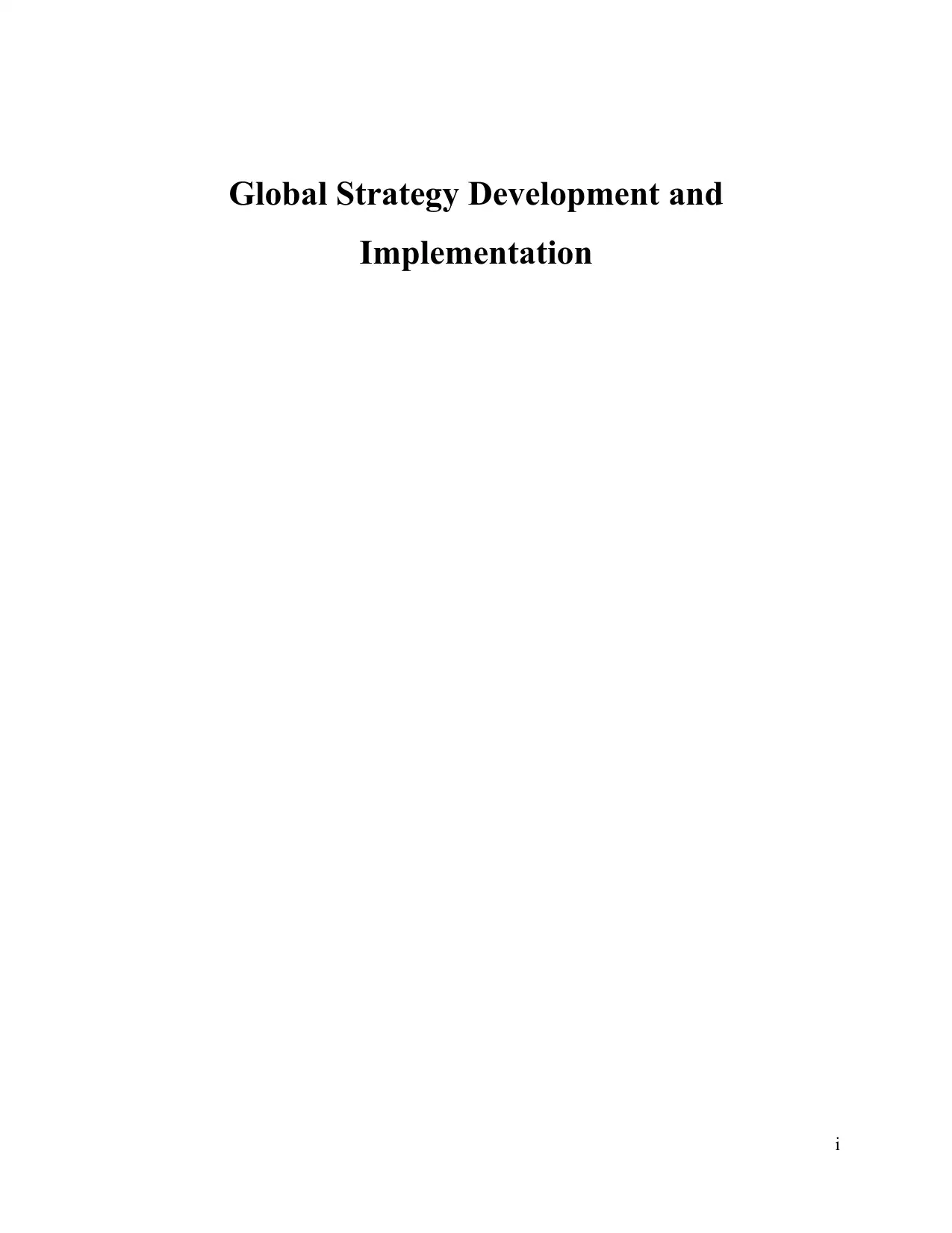
Global Strategy Development and
Implementation
i
Implementation
i
Paraphrase This Document
Need a fresh take? Get an instant paraphrase of this document with our AI Paraphraser
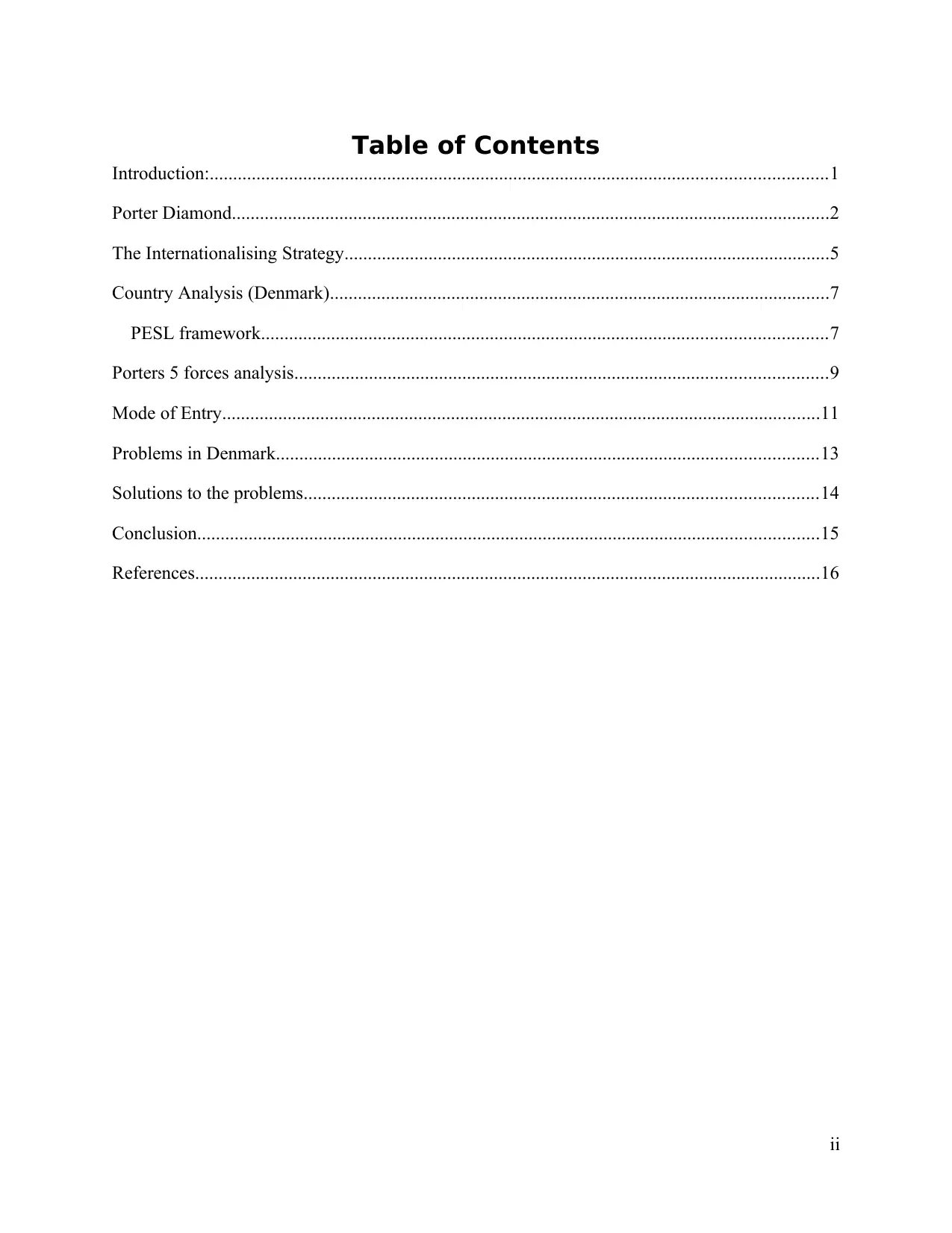
Table of Contents
Introduction:....................................................................................................................................1
Porter Diamond................................................................................................................................2
The Internationalising Strategy........................................................................................................5
Country Analysis (Denmark)...........................................................................................................7
PESL framework.........................................................................................................................7
Porters 5 forces analysis..................................................................................................................9
Mode of Entry................................................................................................................................11
Problems in Denmark....................................................................................................................13
Solutions to the problems..............................................................................................................14
Conclusion.....................................................................................................................................15
References......................................................................................................................................16
ii
Introduction:....................................................................................................................................1
Porter Diamond................................................................................................................................2
The Internationalising Strategy........................................................................................................5
Country Analysis (Denmark)...........................................................................................................7
PESL framework.........................................................................................................................7
Porters 5 forces analysis..................................................................................................................9
Mode of Entry................................................................................................................................11
Problems in Denmark....................................................................................................................13
Solutions to the problems..............................................................................................................14
Conclusion.....................................................................................................................................15
References......................................................................................................................................16
ii
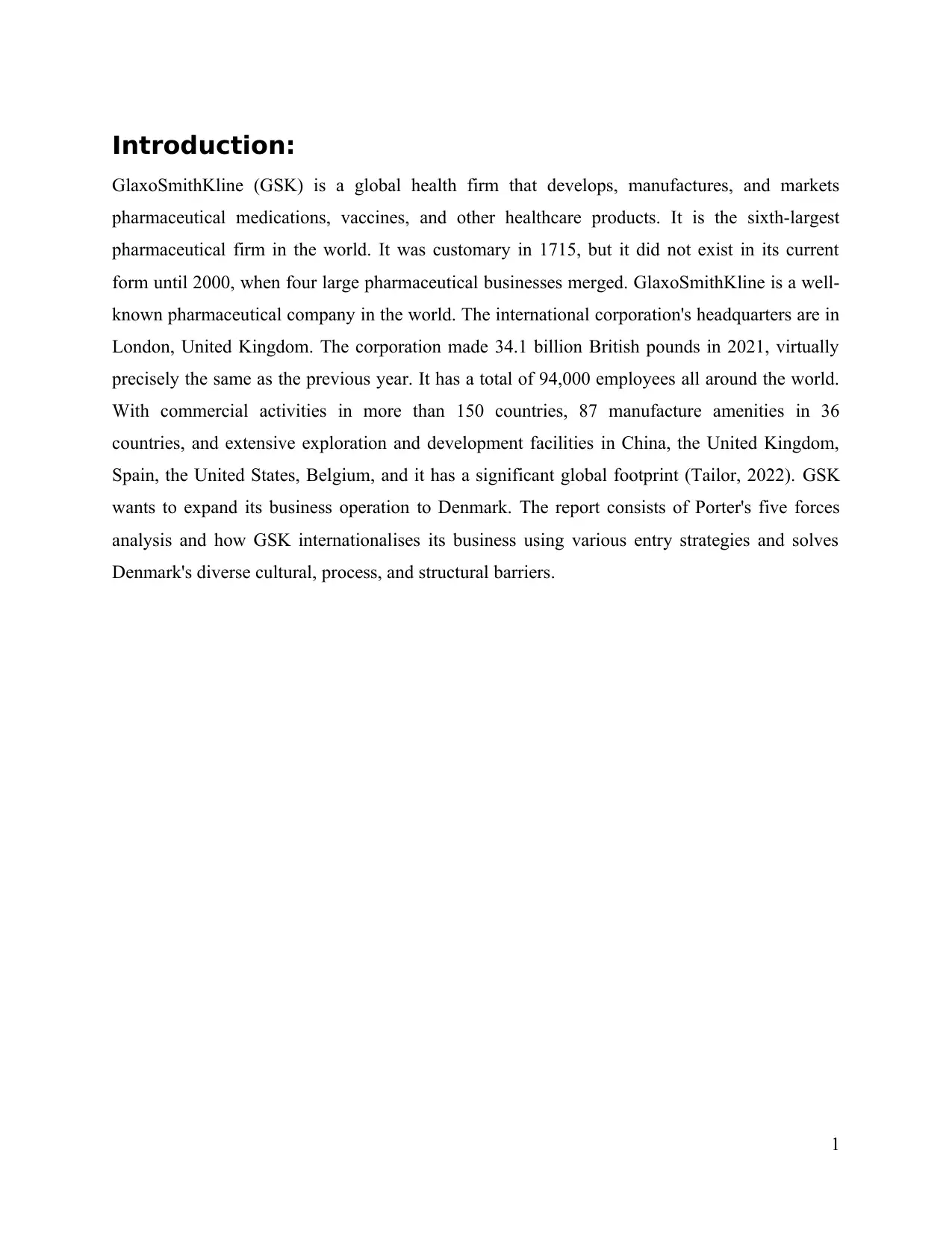
Introduction:
GlaxoSmithKline (GSK) is a global health firm that develops, manufactures, and markets
pharmaceutical medications, vaccines, and other healthcare products. It is the sixth-largest
pharmaceutical firm in the world. It was customary in 1715, but it did not exist in its current
form until 2000, when four large pharmaceutical businesses merged. GlaxoSmithKline is a well-
known pharmaceutical company in the world. The international corporation's headquarters are in
London, United Kingdom. The corporation made 34.1 billion British pounds in 2021, virtually
precisely the same as the previous year. It has a total of 94,000 employees all around the world.
With commercial activities in more than 150 countries, 87 manufacture amenities in 36
countries, and extensive exploration and development facilities in China, the United Kingdom,
Spain, the United States, Belgium, and it has a significant global footprint (Tailor, 2022). GSK
wants to expand its business operation to Denmark. The report consists of Porter's five forces
analysis and how GSK internationalises its business using various entry strategies and solves
Denmark's diverse cultural, process, and structural barriers.
1
GlaxoSmithKline (GSK) is a global health firm that develops, manufactures, and markets
pharmaceutical medications, vaccines, and other healthcare products. It is the sixth-largest
pharmaceutical firm in the world. It was customary in 1715, but it did not exist in its current
form until 2000, when four large pharmaceutical businesses merged. GlaxoSmithKline is a well-
known pharmaceutical company in the world. The international corporation's headquarters are in
London, United Kingdom. The corporation made 34.1 billion British pounds in 2021, virtually
precisely the same as the previous year. It has a total of 94,000 employees all around the world.
With commercial activities in more than 150 countries, 87 manufacture amenities in 36
countries, and extensive exploration and development facilities in China, the United Kingdom,
Spain, the United States, Belgium, and it has a significant global footprint (Tailor, 2022). GSK
wants to expand its business operation to Denmark. The report consists of Porter's five forces
analysis and how GSK internationalises its business using various entry strategies and solves
Denmark's diverse cultural, process, and structural barriers.
1
⊘ This is a preview!⊘
Do you want full access?
Subscribe today to unlock all pages.

Trusted by 1+ million students worldwide
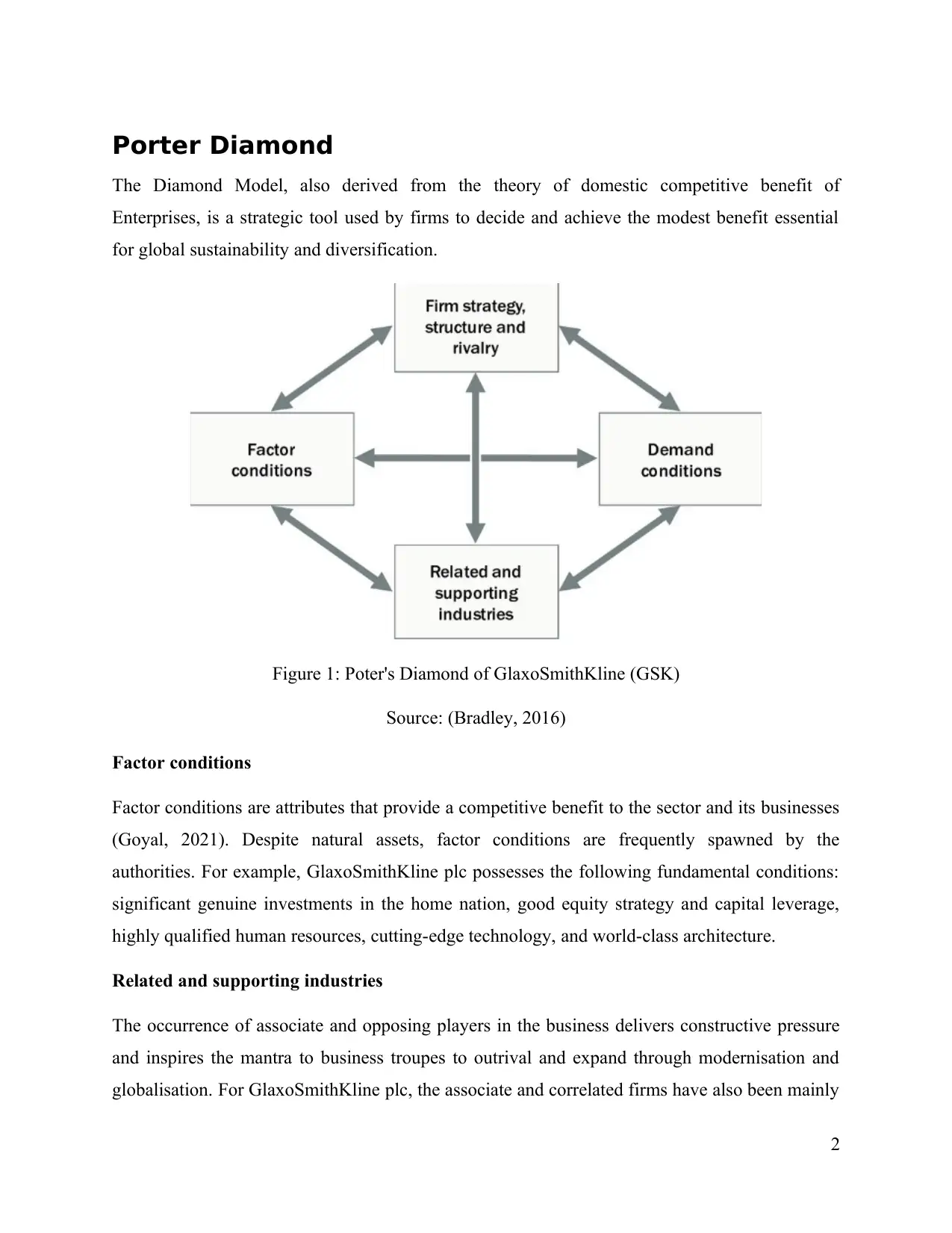
Porter Diamond
The Diamond Model, also derived from the theory of domestic competitive benefit of
Enterprises, is a strategic tool used by firms to decide and achieve the modest benefit essential
for global sustainability and diversification.
Figure 1: Poter's Diamond of GlaxoSmithKline (GSK)
Source: (Bradley, 2016)
Factor conditions
Factor conditions are attributes that provide a competitive benefit to the sector and its businesses
(Goyal, 2021). Despite natural assets, factor conditions are frequently spawned by the
authorities. For example, GlaxoSmithKline plc possesses the following fundamental conditions:
significant genuine investments in the home nation, good equity strategy and capital leverage,
highly qualified human resources, cutting-edge technology, and world-class architecture.
Related and supporting industries
The occurrence of associate and opposing players in the business delivers constructive pressure
and inspires the mantra to business troupes to outrival and expand through modernisation and
globalisation. For GlaxoSmithKline plc, the associate and correlated firms have also been mainly
2
The Diamond Model, also derived from the theory of domestic competitive benefit of
Enterprises, is a strategic tool used by firms to decide and achieve the modest benefit essential
for global sustainability and diversification.
Figure 1: Poter's Diamond of GlaxoSmithKline (GSK)
Source: (Bradley, 2016)
Factor conditions
Factor conditions are attributes that provide a competitive benefit to the sector and its businesses
(Goyal, 2021). Despite natural assets, factor conditions are frequently spawned by the
authorities. For example, GlaxoSmithKline plc possesses the following fundamental conditions:
significant genuine investments in the home nation, good equity strategy and capital leverage,
highly qualified human resources, cutting-edge technology, and world-class architecture.
Related and supporting industries
The occurrence of associate and opposing players in the business delivers constructive pressure
and inspires the mantra to business troupes to outrival and expand through modernisation and
globalisation. For GlaxoSmithKline plc, the associate and correlated firms have also been mainly
2
Paraphrase This Document
Need a fresh take? Get an instant paraphrase of this document with our AI Paraphraser
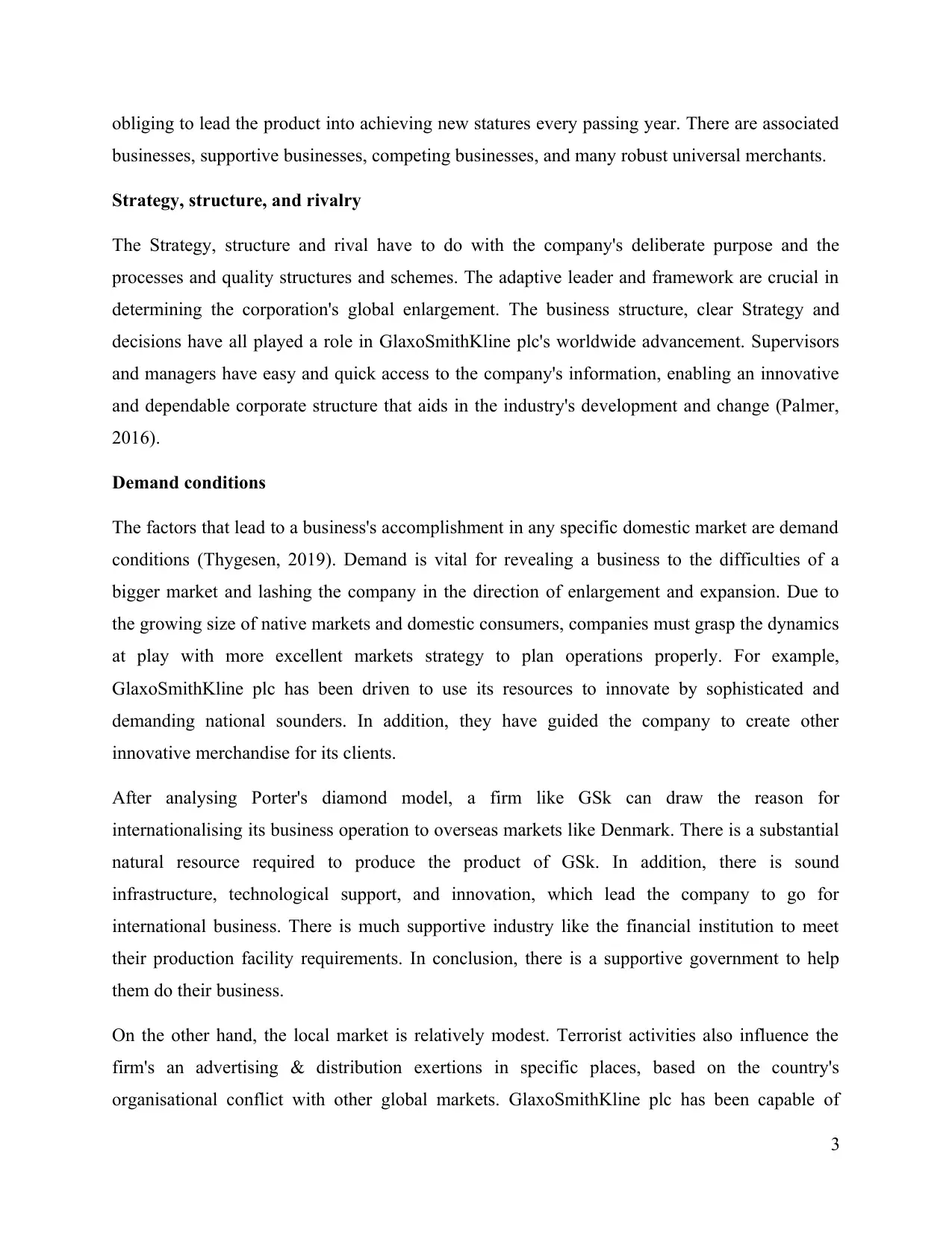
obliging to lead the product into achieving new statures every passing year. There are associated
businesses, supportive businesses, competing businesses, and many robust universal merchants.
Strategy, structure, and rivalry
The Strategy, structure and rival have to do with the company's deliberate purpose and the
processes and quality structures and schemes. The adaptive leader and framework are crucial in
determining the corporation's global enlargement. The business structure, clear Strategy and
decisions have all played a role in GlaxoSmithKline plc's worldwide advancement. Supervisors
and managers have easy and quick access to the company's information, enabling an innovative
and dependable corporate structure that aids in the industry's development and change (Palmer,
2016).
Demand conditions
The factors that lead to a business's accomplishment in any specific domestic market are demand
conditions (Thygesen, 2019). Demand is vital for revealing a business to the difficulties of a
bigger market and lashing the company in the direction of enlargement and expansion. Due to
the growing size of native markets and domestic consumers, companies must grasp the dynamics
at play with more excellent markets strategy to plan operations properly. For example,
GlaxoSmithKline plc has been driven to use its resources to innovate by sophisticated and
demanding national sounders. In addition, they have guided the company to create other
innovative merchandise for its clients.
After analysing Porter's diamond model, a firm like GSk can draw the reason for
internationalising its business operation to overseas markets like Denmark. There is a substantial
natural resource required to produce the product of GSk. In addition, there is sound
infrastructure, technological support, and innovation, which lead the company to go for
international business. There is much supportive industry like the financial institution to meet
their production facility requirements. In conclusion, there is a supportive government to help
them do their business.
On the other hand, the local market is relatively modest. Terrorist activities also influence the
firm's an advertising & distribution exertions in specific places, based on the country's
organisational conflict with other global markets. GlaxoSmithKline plc has been capable of
3
businesses, supportive businesses, competing businesses, and many robust universal merchants.
Strategy, structure, and rivalry
The Strategy, structure and rival have to do with the company's deliberate purpose and the
processes and quality structures and schemes. The adaptive leader and framework are crucial in
determining the corporation's global enlargement. The business structure, clear Strategy and
decisions have all played a role in GlaxoSmithKline plc's worldwide advancement. Supervisors
and managers have easy and quick access to the company's information, enabling an innovative
and dependable corporate structure that aids in the industry's development and change (Palmer,
2016).
Demand conditions
The factors that lead to a business's accomplishment in any specific domestic market are demand
conditions (Thygesen, 2019). Demand is vital for revealing a business to the difficulties of a
bigger market and lashing the company in the direction of enlargement and expansion. Due to
the growing size of native markets and domestic consumers, companies must grasp the dynamics
at play with more excellent markets strategy to plan operations properly. For example,
GlaxoSmithKline plc has been driven to use its resources to innovate by sophisticated and
demanding national sounders. In addition, they have guided the company to create other
innovative merchandise for its clients.
After analysing Porter's diamond model, a firm like GSk can draw the reason for
internationalising its business operation to overseas markets like Denmark. There is a substantial
natural resource required to produce the product of GSk. In addition, there is sound
infrastructure, technological support, and innovation, which lead the company to go for
international business. There is much supportive industry like the financial institution to meet
their production facility requirements. In conclusion, there is a supportive government to help
them do their business.
On the other hand, the local market is relatively modest. Terrorist activities also influence the
firm's an advertising & distribution exertions in specific places, based on the country's
organisational conflict with other global markets. GlaxoSmithKline plc has been capable of
3
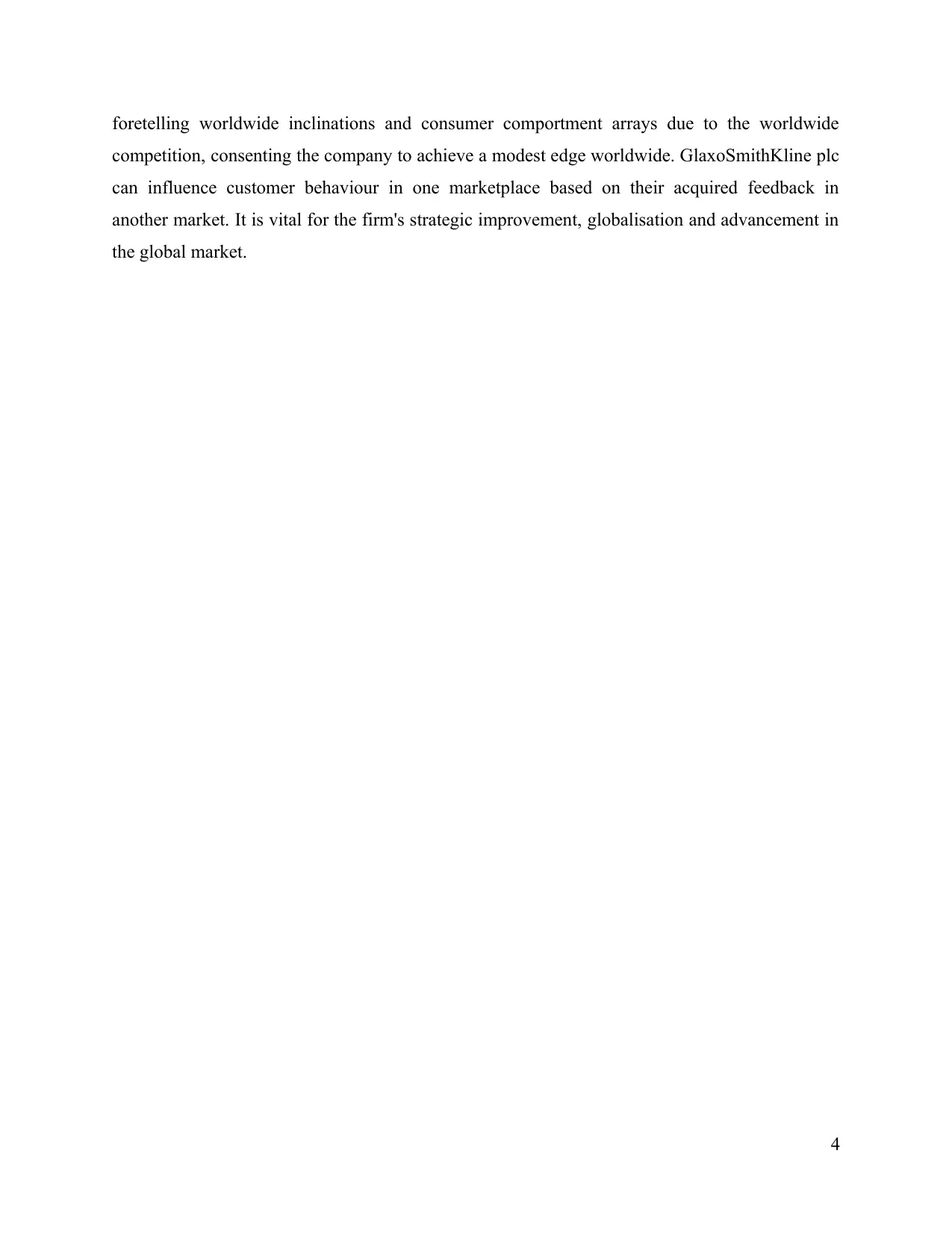
foretelling worldwide inclinations and consumer comportment arrays due to the worldwide
competition, consenting the company to achieve a modest edge worldwide. GlaxoSmithKline plc
can influence customer behaviour in one marketplace based on their acquired feedback in
another market. It is vital for the firm's strategic improvement, globalisation and advancement in
the global market.
4
competition, consenting the company to achieve a modest edge worldwide. GlaxoSmithKline plc
can influence customer behaviour in one marketplace based on their acquired feedback in
another market. It is vital for the firm's strategic improvement, globalisation and advancement in
the global market.
4
⊘ This is a preview!⊘
Do you want full access?
Subscribe today to unlock all pages.

Trusted by 1+ million students worldwide
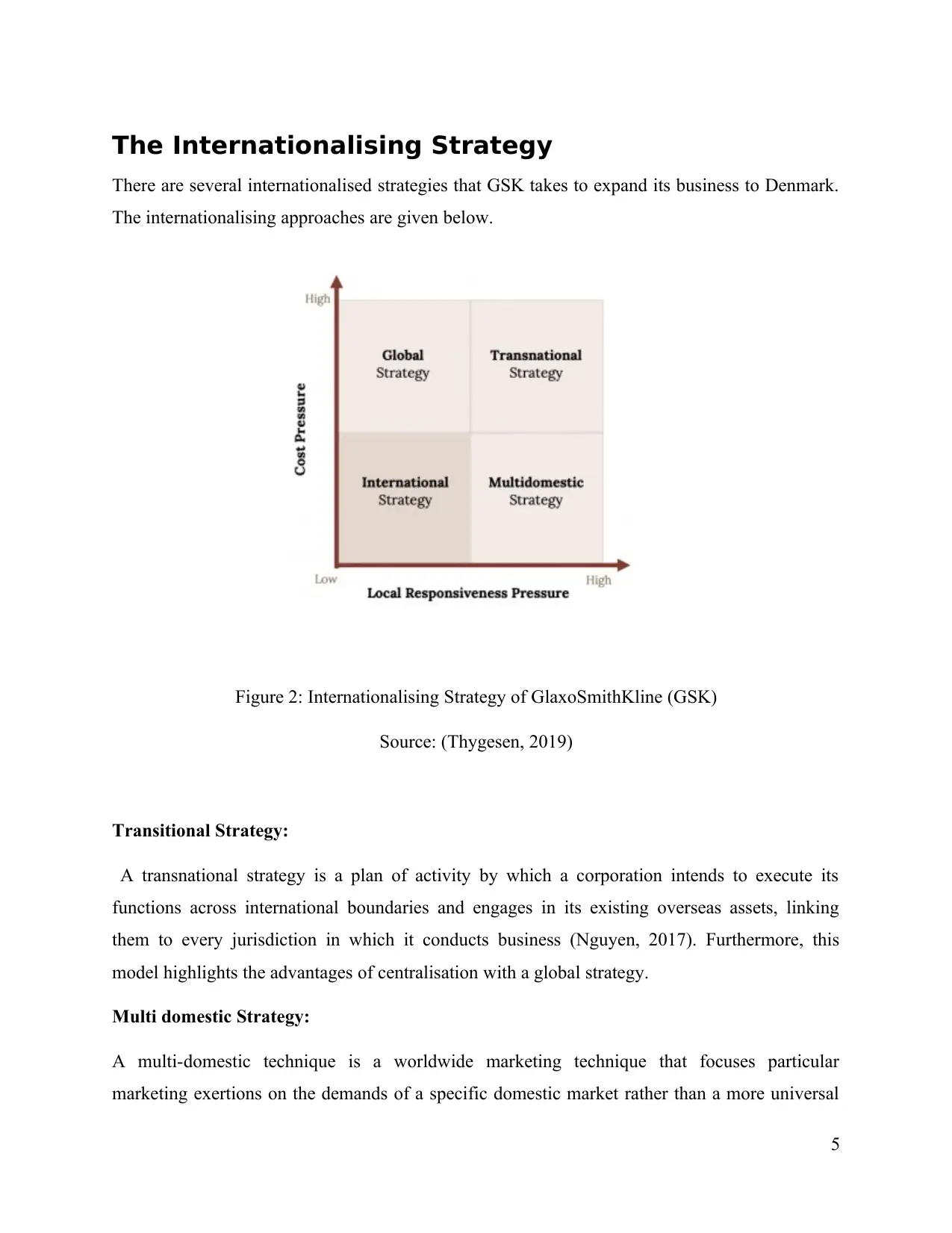
The Internationalising Strategy
There are several internationalised strategies that GSK takes to expand its business to Denmark.
The internationalising approaches are given below.
Figure 2: Internationalising Strategy of GlaxoSmithKline (GSK)
Source: (Thygesen, 2019)
Transitional Strategy:
A transnational strategy is a plan of activity by which a corporation intends to execute its
functions across international boundaries and engages in its existing overseas assets, linking
them to every jurisdiction in which it conducts business (Nguyen, 2017). Furthermore, this
model highlights the advantages of centralisation with a global strategy.
Multi domestic Strategy:
A multi-domestic technique is a worldwide marketing technique that focuses particular
marketing exertions on the demands of a specific domestic market rather than a more universal
5
There are several internationalised strategies that GSK takes to expand its business to Denmark.
The internationalising approaches are given below.
Figure 2: Internationalising Strategy of GlaxoSmithKline (GSK)
Source: (Thygesen, 2019)
Transitional Strategy:
A transnational strategy is a plan of activity by which a corporation intends to execute its
functions across international boundaries and engages in its existing overseas assets, linking
them to every jurisdiction in which it conducts business (Nguyen, 2017). Furthermore, this
model highlights the advantages of centralisation with a global strategy.
Multi domestic Strategy:
A multi-domestic technique is a worldwide marketing technique that focuses particular
marketing exertions on the demands of a specific domestic market rather than a more universal
5
Paraphrase This Document
Need a fresh take? Get an instant paraphrase of this document with our AI Paraphraser
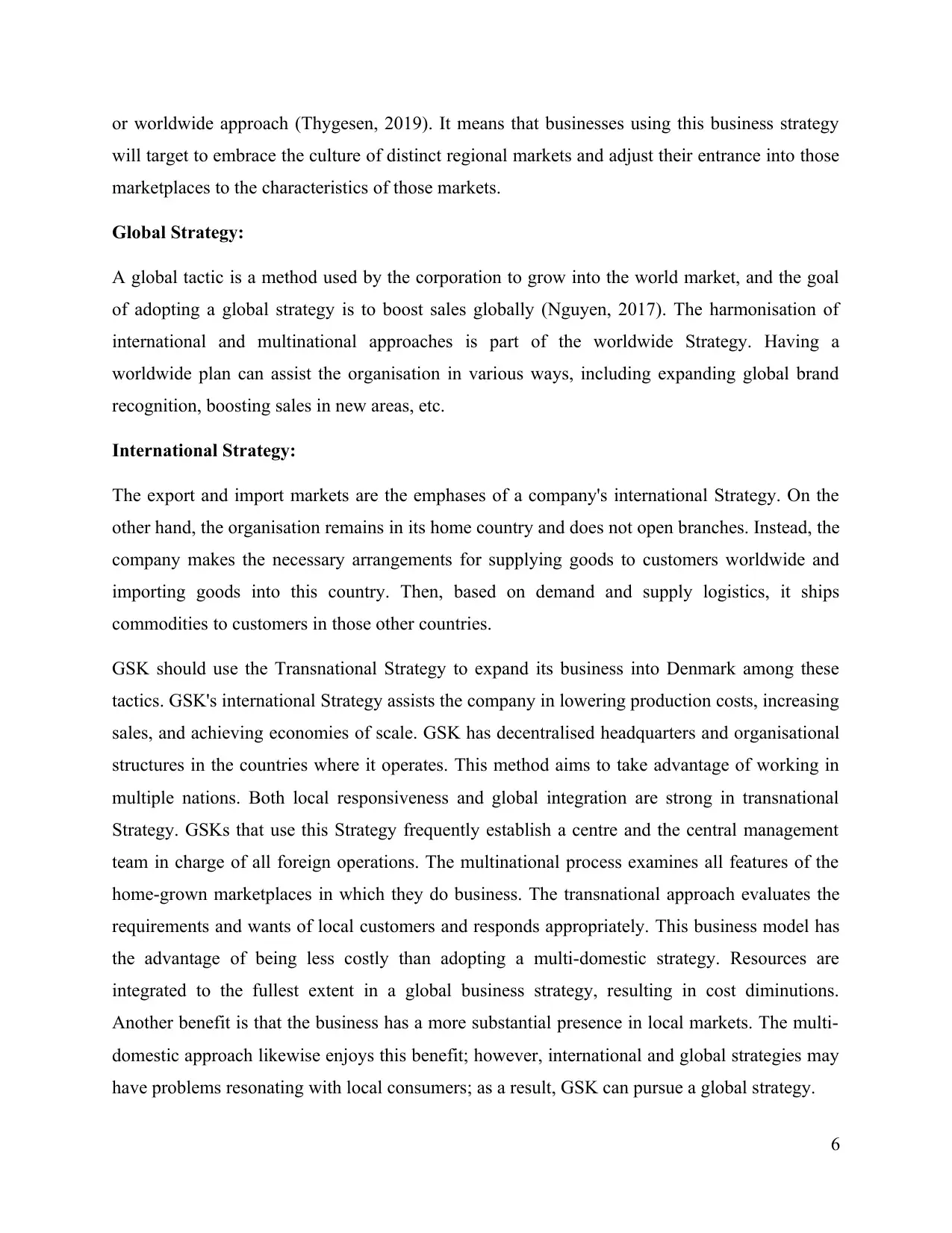
or worldwide approach (Thygesen, 2019). It means that businesses using this business strategy
will target to embrace the culture of distinct regional markets and adjust their entrance into those
marketplaces to the characteristics of those markets.
Global Strategy:
A global tactic is a method used by the corporation to grow into the world market, and the goal
of adopting a global strategy is to boost sales globally (Nguyen, 2017). The harmonisation of
international and multinational approaches is part of the worldwide Strategy. Having a
worldwide plan can assist the organisation in various ways, including expanding global brand
recognition, boosting sales in new areas, etc.
International Strategy:
The export and import markets are the emphases of a company's international Strategy. On the
other hand, the organisation remains in its home country and does not open branches. Instead, the
company makes the necessary arrangements for supplying goods to customers worldwide and
importing goods into this country. Then, based on demand and supply logistics, it ships
commodities to customers in those other countries.
GSK should use the Transnational Strategy to expand its business into Denmark among these
tactics. GSK's international Strategy assists the company in lowering production costs, increasing
sales, and achieving economies of scale. GSK has decentralised headquarters and organisational
structures in the countries where it operates. This method aims to take advantage of working in
multiple nations. Both local responsiveness and global integration are strong in transnational
Strategy. GSKs that use this Strategy frequently establish a centre and the central management
team in charge of all foreign operations. The multinational process examines all features of the
home-grown marketplaces in which they do business. The transnational approach evaluates the
requirements and wants of local customers and responds appropriately. This business model has
the advantage of being less costly than adopting a multi-domestic strategy. Resources are
integrated to the fullest extent in a global business strategy, resulting in cost diminutions.
Another benefit is that the business has a more substantial presence in local markets. The multi-
domestic approach likewise enjoys this benefit; however, international and global strategies may
have problems resonating with local consumers; as a result, GSK can pursue a global strategy.
6
will target to embrace the culture of distinct regional markets and adjust their entrance into those
marketplaces to the characteristics of those markets.
Global Strategy:
A global tactic is a method used by the corporation to grow into the world market, and the goal
of adopting a global strategy is to boost sales globally (Nguyen, 2017). The harmonisation of
international and multinational approaches is part of the worldwide Strategy. Having a
worldwide plan can assist the organisation in various ways, including expanding global brand
recognition, boosting sales in new areas, etc.
International Strategy:
The export and import markets are the emphases of a company's international Strategy. On the
other hand, the organisation remains in its home country and does not open branches. Instead, the
company makes the necessary arrangements for supplying goods to customers worldwide and
importing goods into this country. Then, based on demand and supply logistics, it ships
commodities to customers in those other countries.
GSK should use the Transnational Strategy to expand its business into Denmark among these
tactics. GSK's international Strategy assists the company in lowering production costs, increasing
sales, and achieving economies of scale. GSK has decentralised headquarters and organisational
structures in the countries where it operates. This method aims to take advantage of working in
multiple nations. Both local responsiveness and global integration are strong in transnational
Strategy. GSKs that use this Strategy frequently establish a centre and the central management
team in charge of all foreign operations. The multinational process examines all features of the
home-grown marketplaces in which they do business. The transnational approach evaluates the
requirements and wants of local customers and responds appropriately. This business model has
the advantage of being less costly than adopting a multi-domestic strategy. Resources are
integrated to the fullest extent in a global business strategy, resulting in cost diminutions.
Another benefit is that the business has a more substantial presence in local markets. The multi-
domestic approach likewise enjoys this benefit; however, international and global strategies may
have problems resonating with local consumers; as a result, GSK can pursue a global strategy.
6
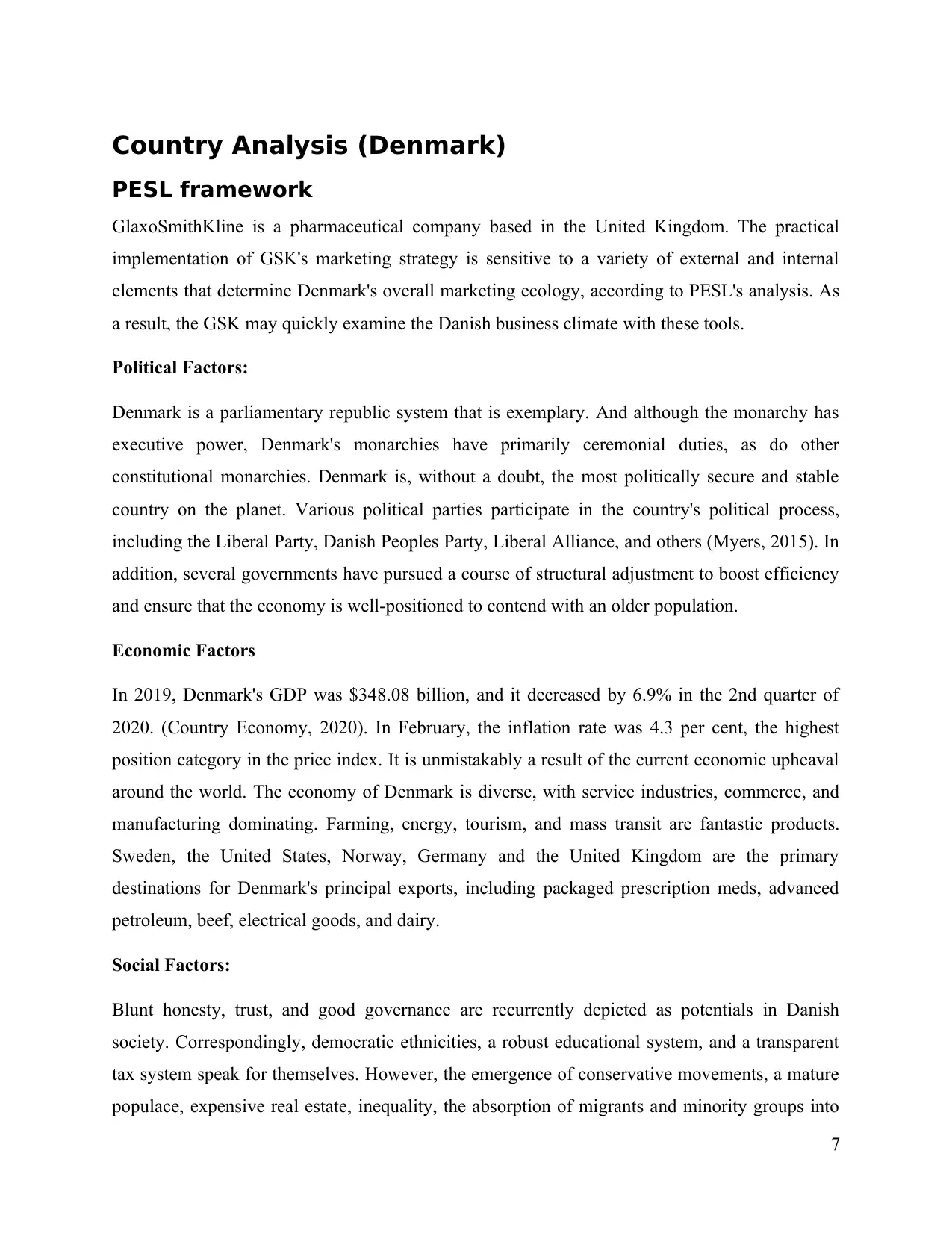
Country Analysis (Denmark)
PESL framework
GlaxoSmithKline is a pharmaceutical company based in the United Kingdom. The practical
implementation of GSK's marketing strategy is sensitive to a variety of external and internal
elements that determine Denmark's overall marketing ecology, according to PESL's analysis. As
a result, the GSK may quickly examine the Danish business climate with these tools.
Political Factors:
Denmark is a parliamentary republic system that is exemplary. And although the monarchy has
executive power, Denmark's monarchies have primarily ceremonial duties, as do other
constitutional monarchies. Denmark is, without a doubt, the most politically secure and stable
country on the planet. Various political parties participate in the country's political process,
including the Liberal Party, Danish Peoples Party, Liberal Alliance, and others (Myers, 2015). In
addition, several governments have pursued a course of structural adjustment to boost efficiency
and ensure that the economy is well-positioned to contend with an older population.
Economic Factors
In 2019, Denmark's GDP was $348.08 billion, and it decreased by 6.9% in the 2nd quarter of
2020. (Country Economy, 2020). In February, the inflation rate was 4.3 per cent, the highest
position category in the price index. It is unmistakably a result of the current economic upheaval
around the world. The economy of Denmark is diverse, with service industries, commerce, and
manufacturing dominating. Farming, energy, tourism, and mass transit are fantastic products.
Sweden, the United States, Norway, Germany and the United Kingdom are the primary
destinations for Denmark's principal exports, including packaged prescription meds, advanced
petroleum, beef, electrical goods, and dairy.
Social Factors:
Blunt honesty, trust, and good governance are recurrently depicted as potentials in Danish
society. Correspondingly, democratic ethnicities, a robust educational system, and a transparent
tax system speak for themselves. However, the emergence of conservative movements, a mature
populace, expensive real estate, inequality, the absorption of migrants and minority groups into
7
PESL framework
GlaxoSmithKline is a pharmaceutical company based in the United Kingdom. The practical
implementation of GSK's marketing strategy is sensitive to a variety of external and internal
elements that determine Denmark's overall marketing ecology, according to PESL's analysis. As
a result, the GSK may quickly examine the Danish business climate with these tools.
Political Factors:
Denmark is a parliamentary republic system that is exemplary. And although the monarchy has
executive power, Denmark's monarchies have primarily ceremonial duties, as do other
constitutional monarchies. Denmark is, without a doubt, the most politically secure and stable
country on the planet. Various political parties participate in the country's political process,
including the Liberal Party, Danish Peoples Party, Liberal Alliance, and others (Myers, 2015). In
addition, several governments have pursued a course of structural adjustment to boost efficiency
and ensure that the economy is well-positioned to contend with an older population.
Economic Factors
In 2019, Denmark's GDP was $348.08 billion, and it decreased by 6.9% in the 2nd quarter of
2020. (Country Economy, 2020). In February, the inflation rate was 4.3 per cent, the highest
position category in the price index. It is unmistakably a result of the current economic upheaval
around the world. The economy of Denmark is diverse, with service industries, commerce, and
manufacturing dominating. Farming, energy, tourism, and mass transit are fantastic products.
Sweden, the United States, Norway, Germany and the United Kingdom are the primary
destinations for Denmark's principal exports, including packaged prescription meds, advanced
petroleum, beef, electrical goods, and dairy.
Social Factors:
Blunt honesty, trust, and good governance are recurrently depicted as potentials in Danish
society. Correspondingly, democratic ethnicities, a robust educational system, and a transparent
tax system speak for themselves. However, the emergence of conservative movements, a mature
populace, expensive real estate, inequality, the absorption of migrants and minority groups into
7
⊘ This is a preview!⊘
Do you want full access?
Subscribe today to unlock all pages.

Trusted by 1+ million students worldwide
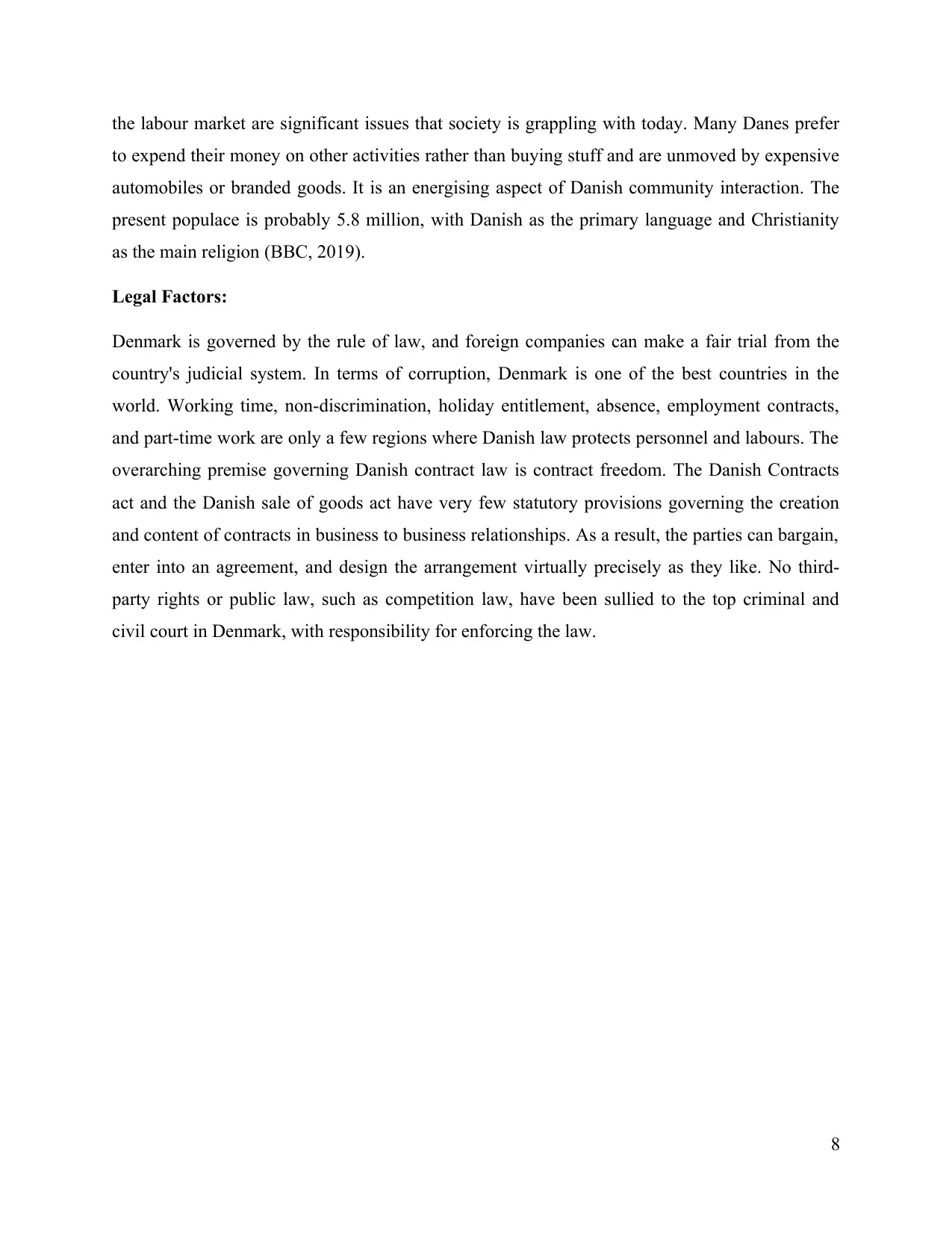
the labour market are significant issues that society is grappling with today. Many Danes prefer
to expend their money on other activities rather than buying stuff and are unmoved by expensive
automobiles or branded goods. It is an energising aspect of Danish community interaction. The
present populace is probably 5.8 million, with Danish as the primary language and Christianity
as the main religion (BBC, 2019).
Legal Factors:
Denmark is governed by the rule of law, and foreign companies can make a fair trial from the
country's judicial system. In terms of corruption, Denmark is one of the best countries in the
world. Working time, non-discrimination, holiday entitlement, absence, employment contracts,
and part-time work are only a few regions where Danish law protects personnel and labours. The
overarching premise governing Danish contract law is contract freedom. The Danish Contracts
act and the Danish sale of goods act have very few statutory provisions governing the creation
and content of contracts in business to business relationships. As a result, the parties can bargain,
enter into an agreement, and design the arrangement virtually precisely as they like. No third-
party rights or public law, such as competition law, have been sullied to the top criminal and
civil court in Denmark, with responsibility for enforcing the law.
8
to expend their money on other activities rather than buying stuff and are unmoved by expensive
automobiles or branded goods. It is an energising aspect of Danish community interaction. The
present populace is probably 5.8 million, with Danish as the primary language and Christianity
as the main religion (BBC, 2019).
Legal Factors:
Denmark is governed by the rule of law, and foreign companies can make a fair trial from the
country's judicial system. In terms of corruption, Denmark is one of the best countries in the
world. Working time, non-discrimination, holiday entitlement, absence, employment contracts,
and part-time work are only a few regions where Danish law protects personnel and labours. The
overarching premise governing Danish contract law is contract freedom. The Danish Contracts
act and the Danish sale of goods act have very few statutory provisions governing the creation
and content of contracts in business to business relationships. As a result, the parties can bargain,
enter into an agreement, and design the arrangement virtually precisely as they like. No third-
party rights or public law, such as competition law, have been sullied to the top criminal and
civil court in Denmark, with responsibility for enforcing the law.
8
Paraphrase This Document
Need a fresh take? Get an instant paraphrase of this document with our AI Paraphraser
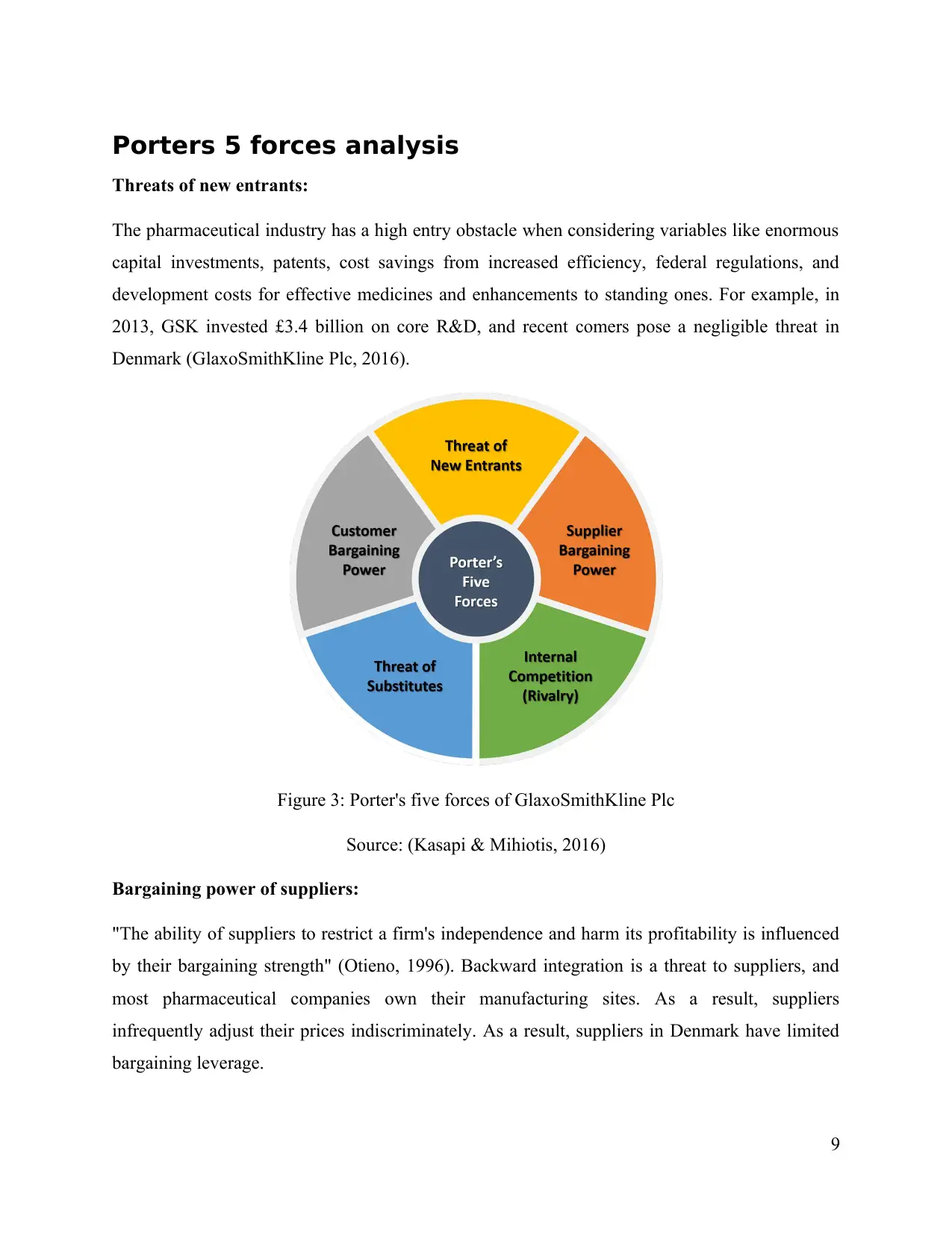
Porters 5 forces analysis
Threats of new entrants:
The pharmaceutical industry has a high entry obstacle when considering variables like enormous
capital investments, patents, cost savings from increased efficiency, federal regulations, and
development costs for effective medicines and enhancements to standing ones. For example, in
2013, GSK invested £3.4 billion on core R&D, and recent comers pose a negligible threat in
Denmark (GlaxoSmithKline Plc, 2016).
Figure 3: Porter's five forces of GlaxoSmithKline Plc
Source: (Kasapi & Mihiotis, 2016)
Bargaining power of suppliers:
"The ability of suppliers to restrict a firm's independence and harm its profitability is influenced
by their bargaining strength" (Otieno, 1996). Backward integration is a threat to suppliers, and
most pharmaceutical companies own their manufacturing sites. As a result, suppliers
infrequently adjust their prices indiscriminately. As a result, suppliers in Denmark have limited
bargaining leverage.
9
Threats of new entrants:
The pharmaceutical industry has a high entry obstacle when considering variables like enormous
capital investments, patents, cost savings from increased efficiency, federal regulations, and
development costs for effective medicines and enhancements to standing ones. For example, in
2013, GSK invested £3.4 billion on core R&D, and recent comers pose a negligible threat in
Denmark (GlaxoSmithKline Plc, 2016).
Figure 3: Porter's five forces of GlaxoSmithKline Plc
Source: (Kasapi & Mihiotis, 2016)
Bargaining power of suppliers:
"The ability of suppliers to restrict a firm's independence and harm its profitability is influenced
by their bargaining strength" (Otieno, 1996). Backward integration is a threat to suppliers, and
most pharmaceutical companies own their manufacturing sites. As a result, suppliers
infrequently adjust their prices indiscriminately. As a result, suppliers in Denmark have limited
bargaining leverage.
9
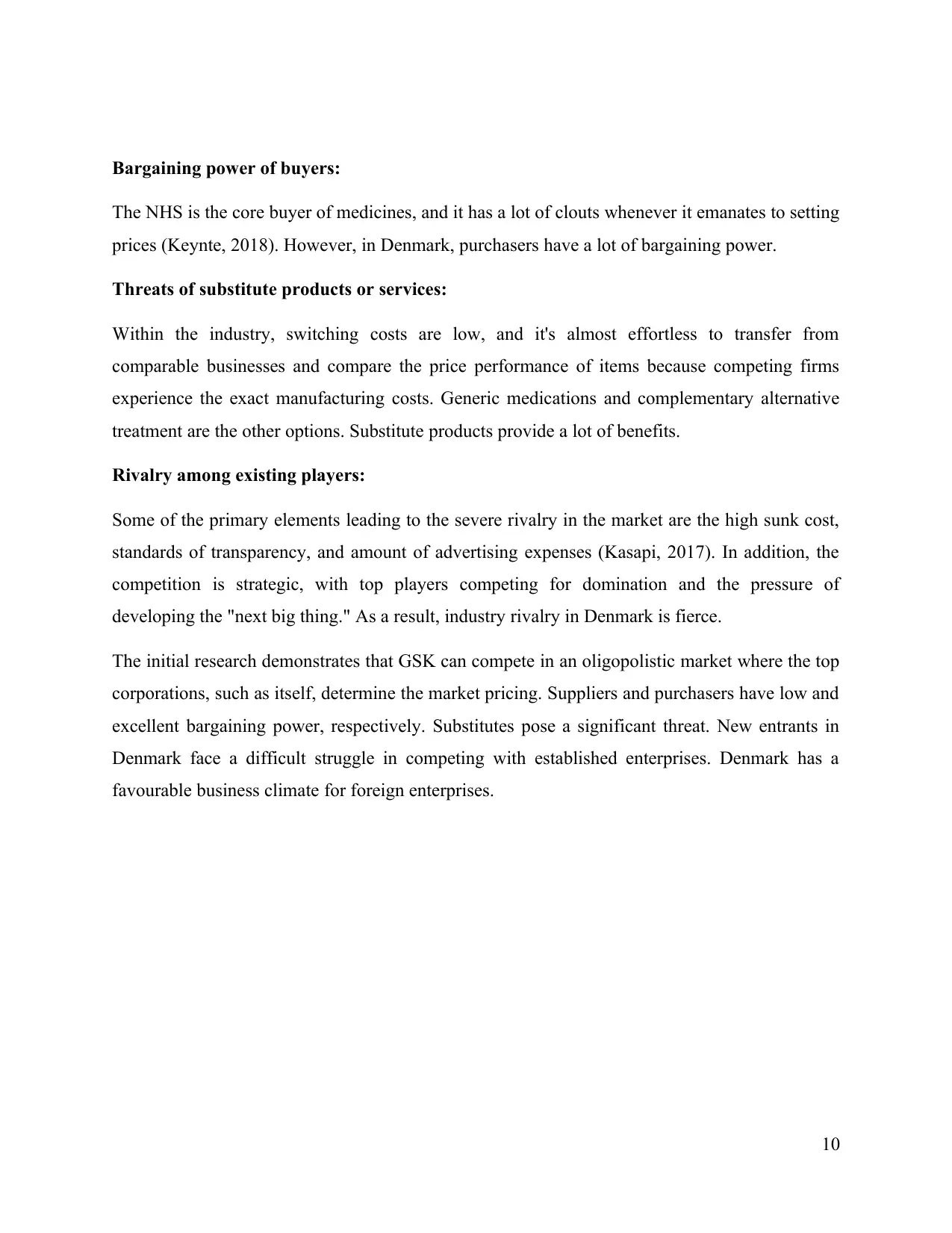
Bargaining power of buyers:
The NHS is the core buyer of medicines, and it has a lot of clouts whenever it emanates to setting
prices (Keynte, 2018). However, in Denmark, purchasers have a lot of bargaining power.
Threats of substitute products or services:
Within the industry, switching costs are low, and it's almost effortless to transfer from
comparable businesses and compare the price performance of items because competing firms
experience the exact manufacturing costs. Generic medications and complementary alternative
treatment are the other options. Substitute products provide a lot of benefits.
Rivalry among existing players:
Some of the primary elements leading to the severe rivalry in the market are the high sunk cost,
standards of transparency, and amount of advertising expenses (Kasapi, 2017). In addition, the
competition is strategic, with top players competing for domination and the pressure of
developing the "next big thing." As a result, industry rivalry in Denmark is fierce.
The initial research demonstrates that GSK can compete in an oligopolistic market where the top
corporations, such as itself, determine the market pricing. Suppliers and purchasers have low and
excellent bargaining power, respectively. Substitutes pose a significant threat. New entrants in
Denmark face a difficult struggle in competing with established enterprises. Denmark has a
favourable business climate for foreign enterprises.
10
The NHS is the core buyer of medicines, and it has a lot of clouts whenever it emanates to setting
prices (Keynte, 2018). However, in Denmark, purchasers have a lot of bargaining power.
Threats of substitute products or services:
Within the industry, switching costs are low, and it's almost effortless to transfer from
comparable businesses and compare the price performance of items because competing firms
experience the exact manufacturing costs. Generic medications and complementary alternative
treatment are the other options. Substitute products provide a lot of benefits.
Rivalry among existing players:
Some of the primary elements leading to the severe rivalry in the market are the high sunk cost,
standards of transparency, and amount of advertising expenses (Kasapi, 2017). In addition, the
competition is strategic, with top players competing for domination and the pressure of
developing the "next big thing." As a result, industry rivalry in Denmark is fierce.
The initial research demonstrates that GSK can compete in an oligopolistic market where the top
corporations, such as itself, determine the market pricing. Suppliers and purchasers have low and
excellent bargaining power, respectively. Substitutes pose a significant threat. New entrants in
Denmark face a difficult struggle in competing with established enterprises. Denmark has a
favourable business climate for foreign enterprises.
10
⊘ This is a preview!⊘
Do you want full access?
Subscribe today to unlock all pages.

Trusted by 1+ million students worldwide
1 out of 20
Related Documents
Your All-in-One AI-Powered Toolkit for Academic Success.
+13062052269
info@desklib.com
Available 24*7 on WhatsApp / Email
![[object Object]](/_next/static/media/star-bottom.7253800d.svg)
Unlock your academic potential
Copyright © 2020–2026 A2Z Services. All Rights Reserved. Developed and managed by ZUCOL.





